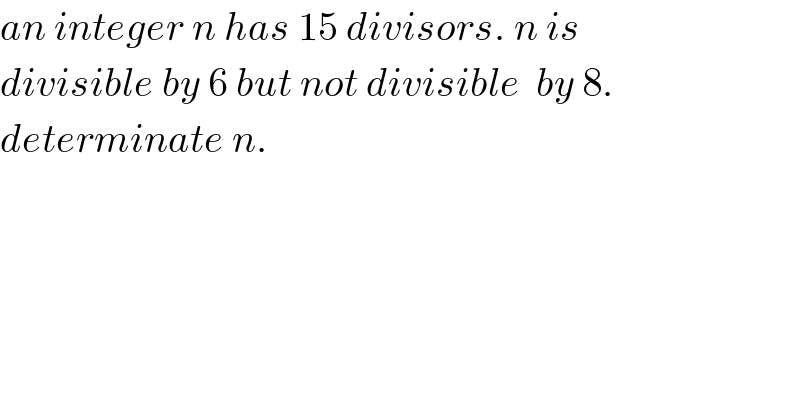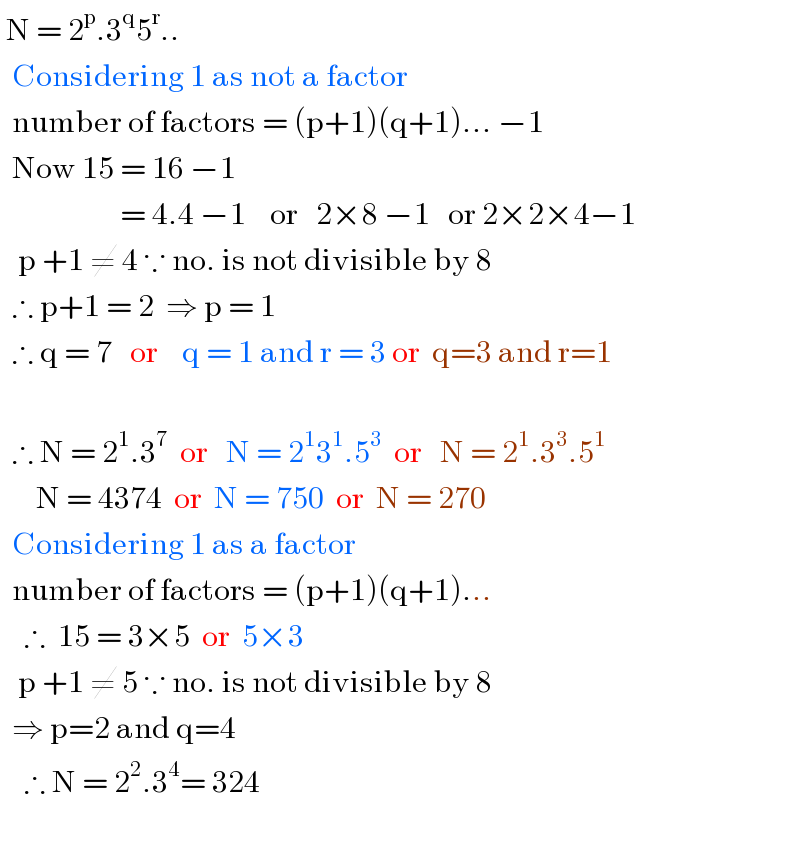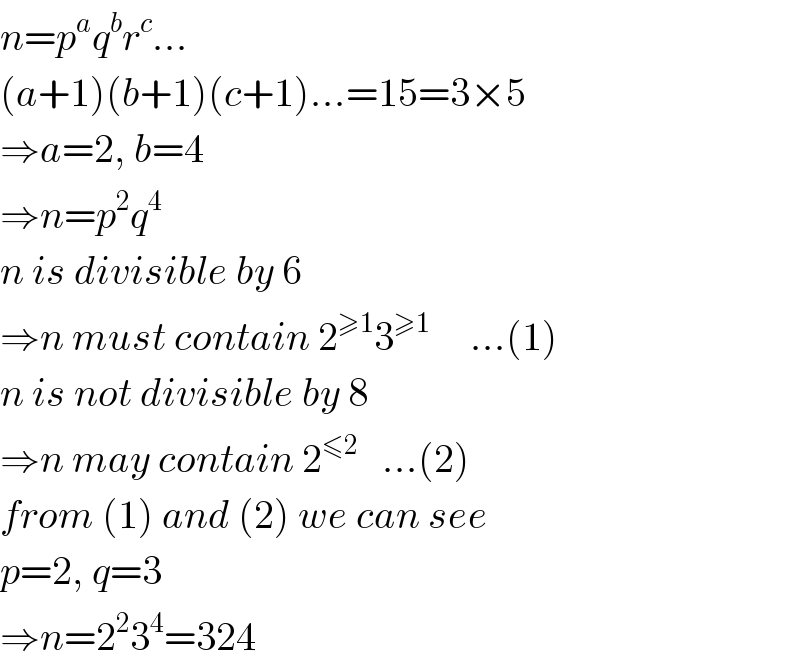
Question Number 124513 by mathocean1 last updated on 03/Dec/20

$${an}\:{integer}\:{n}\:{has}\:\mathrm{15}\:{divisors}.\:{n}\:{is} \\ $$$${divisible}\:{by}\:\mathrm{6}\:{but}\:{not}\:{divisible}\:\:{by}\:\mathrm{8}. \\ $$$${determinate}\:{n}. \\ $$
Commented by mr W last updated on 03/Dec/20

$$\mathrm{324}? \\ $$
Commented by soumyasaha last updated on 04/Dec/20

$$\:\mathrm{N}\:=\:\mathrm{2}^{\mathrm{p}} .\mathrm{3}^{\mathrm{q}} \mathrm{5}^{\mathrm{r}} .. \\ $$$$\:\:\mathrm{Considering}\:\mathrm{1}\:\mathrm{as}\:\mathrm{not}\:\mathrm{a}\:\mathrm{factor} \\ $$$$\:\:\mathrm{number}\:\mathrm{of}\:\mathrm{factors}\:=\:\left(\mathrm{p}+\mathrm{1}\right)\left(\mathrm{q}+\mathrm{1}\right)...\:−\mathrm{1} \\ $$$$\:\:\mathrm{Now}\:\mathrm{15}\:=\:\mathrm{16}\:−\mathrm{1} \\ $$$$\:\:\:\:\:\:\:\:\:\:\:\:\:\:\:\:\:\:\:\:=\:\mathrm{4}.\mathrm{4}\:−\mathrm{1}\:\:\:\:\mathrm{or}\:\:\:\mathrm{2}×\mathrm{8}\:−\mathrm{1}\:\:\:\mathrm{or}\:\mathrm{2}×\mathrm{2}×\mathrm{4}−\mathrm{1} \\ $$$$\:\:\:\mathrm{p}\:+\mathrm{1}\:\neq\:\mathrm{4}\:\because\:\mathrm{no}.\:\mathrm{is}\:\mathrm{not}\:\mathrm{divisible}\:\mathrm{by}\:\mathrm{8} \\ $$$$\:\:\therefore\:\mathrm{p}+\mathrm{1}\:=\:\mathrm{2}\:\:\Rightarrow\:\mathrm{p}\:=\:\mathrm{1} \\ $$$$\:\:\therefore\:\mathrm{q}\:=\:\mathrm{7}\:\:\:\mathrm{or}\:\:\:\:\mathrm{q}\:=\:\mathrm{1}\:\mathrm{and}\:\mathrm{r}\:=\:\mathrm{3}\:\mathrm{or}\:\:\mathrm{q}=\mathrm{3}\:\mathrm{and}\:\mathrm{r}=\mathrm{1} \\ $$$$\:\:\:\: \\ $$$$\:\:\therefore\:\mathrm{N}\:=\:\mathrm{2}^{\mathrm{1}} .\mathrm{3}^{\mathrm{7}} \:\:\mathrm{or}\:\:\:\mathrm{N}\:=\:\mathrm{2}^{\mathrm{1}} \mathrm{3}^{\mathrm{1}} .\mathrm{5}^{\mathrm{3}} \:\:\mathrm{or}\:\:\:\mathrm{N}\:=\:\mathrm{2}^{\mathrm{1}} .\mathrm{3}^{\mathrm{3}} .\mathrm{5}^{\mathrm{1}} \\ $$$$\:\:\:\:\:\:\mathrm{N}\:=\:\mathrm{4374}\:\:\mathrm{or}\:\:\mathrm{N}\:=\:\mathrm{750}\:\:\mathrm{or}\:\:\mathrm{N}\:=\:\mathrm{270} \\ $$$$\:\:\mathrm{Considering}\:\mathrm{1}\:\mathrm{as}\:\mathrm{a}\:\mathrm{factor} \\ $$$$\:\:\mathrm{number}\:\mathrm{of}\:\mathrm{factors}\:=\:\left(\mathrm{p}+\mathrm{1}\right)\left(\mathrm{q}+\mathrm{1}\right)... \\ $$$$\:\:\:\:\therefore\:\:\mathrm{15}\:=\:\mathrm{3}×\mathrm{5}\:\:\mathrm{or}\:\:\mathrm{5}×\mathrm{3} \\ $$$$\:\:\:\mathrm{p}\:+\mathrm{1}\:\neq\:\mathrm{5}\:\because\:\mathrm{no}.\:\mathrm{is}\:\mathrm{not}\:\mathrm{divisible}\:\mathrm{by}\:\mathrm{8} \\ $$$$\:\:\Rightarrow\:\mathrm{p}=\mathrm{2}\:\mathrm{and}\:\mathrm{q}=\mathrm{4}\:\: \\ $$$$\:\:\:\:\therefore\:\mathrm{N}\:=\:\mathrm{2}^{\mathrm{2}} .\mathrm{3}^{\mathrm{4}} =\:\mathrm{324} \\ $$$$ \\ $$
Answered by mr W last updated on 04/Dec/20

$${n}={p}^{{a}} {q}^{{b}} {r}^{{c}} ... \\ $$$$\left({a}+\mathrm{1}\right)\left({b}+\mathrm{1}\right)\left({c}+\mathrm{1}\right)...=\mathrm{15}=\mathrm{3}×\mathrm{5} \\ $$$$\Rightarrow{a}=\mathrm{2},\:{b}=\mathrm{4} \\ $$$$\Rightarrow{n}={p}^{\mathrm{2}} {q}^{\mathrm{4}} \\ $$$${n}\:{is}\:{divisible}\:{by}\:\mathrm{6} \\ $$$$\Rightarrow{n}\:{must}\:{contain}\:\mathrm{2}^{\geqslant\mathrm{1}} \mathrm{3}^{\geqslant\mathrm{1}} \:\:\:\:\:...\left(\mathrm{1}\right) \\ $$$${n}\:{is}\:{not}\:{divisible}\:{by}\:\mathrm{8} \\ $$$$\Rightarrow{n}\:{may}\:{contain}\:\mathrm{2}^{\leqslant\mathrm{2}} \:\:\:...\left(\mathrm{2}\right) \\ $$$${from}\:\left(\mathrm{1}\right)\:{and}\:\left(\mathrm{2}\right)\:{we}\:{can}\:{see} \\ $$$${p}=\mathrm{2},\:{q}=\mathrm{3} \\ $$$$\Rightarrow{n}=\mathrm{2}^{\mathrm{2}} \mathrm{3}^{\mathrm{4}} =\mathrm{324} \\ $$
